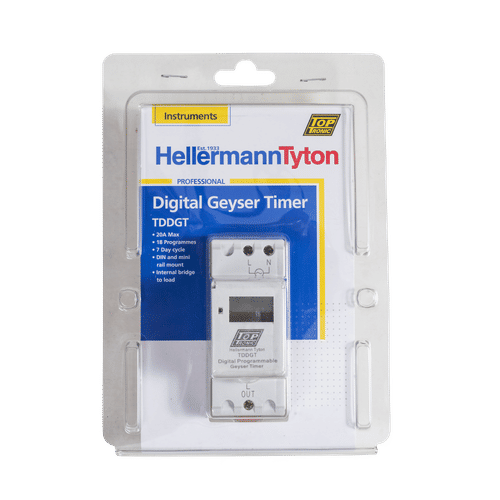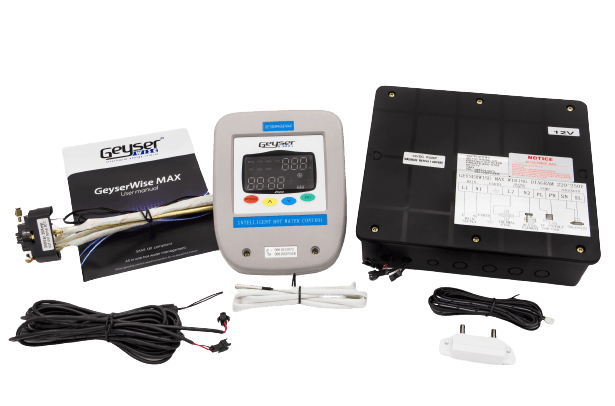Discover the Benefits of Using a Geyser Timer in Your Home
Wiki Article
Why Geyser Timers Are Essential for Avoiding Getting Too Hot and Enhancing Energy Effectiveness
Geyser timers represent an essential innovation in home energy administration, especially in their capacity to protect against overheating and enhance energy effectiveness. By allowing house owners to customize their warm water heating routines, these gadgets lessen unnecessary power usage and minimize the danger of system strain. The effects of such technology extend beyond prompt price savings, affecting long-lasting sustainability and security. The possible benefits are frequently overlooked, motivating a more detailed exam of exactly how these timers can transform standard techniques into much more reliable regimens. When incorporating Geyser timers into existing systems?, what factors should be taken into consideration.Understanding Geyser Timers
Geyser timers are necessary devices developed to enhance power efficiency in warm water systems. These timers regulate the operation of hot springs by enabling customers to set certain times for heating water, thereby lessening energy intake during off-peak hours - geyser timer. By limiting the operating time of the Geyser, these gadgets considerably decrease electricity use, which can lead to reduced utility costs and a lowered carbon footprint
Furthermore, Geyser timers add to the long life of warm water systems by protecting against extreme heating cycles. By guaranteeing that the Geyser runs just when needed, these devices help keep optimum performance and decrease damage on the heating aspect. Generally, Geyser timers are an important financial investment for any kind of house owner seeking to improve power performance and enhance hot water usage.
Advantages of Avoiding Overheating
One key advantage of preventing getting too hot in hot water systems is the substantial reduction in energy consumption. When water is warmed beyond necessary degrees, energy is thrown away, resulting in greater utility costs and unnecessary strain on the heater. By applying effective temperature level guideline, such as through Geyser timers, customers can make sure that water is maintained at an optimum temperature, consequently minimizing power expenditure.Additionally, avoiding overheating adds to the long life of the heating system. Too much warm can create premature deterioration on elements, leading to expensive repairs or replacements. By keeping stable operating conditions, individuals can expand the lifespan of their geysers, causing higher long-term cost savings.

Power Performance Insights
Reliable power management see is vital for lowering overall consumption in domestic settings, particularly when it concerns hot water systems. Geyser timers play an essential duty in boosting power effectiveness by regulating the heating cycles of water heating units. By enabling house owners to set particular operating times, these gadgets stop unnecessary heating when hot water need is low, thus mitigating energy waste.Including Geyser timers into warm water systems not just maximizes energy use yet also lines up with sustainable techniques. Gradually, they can substantially decrease the carbon impact related to excessive power usage. Additionally, the assimilation of wise technology right into Geyser timers advertises real-time tracking and adjustment, using users understandings right into their energy usage patterns.
When incorporated with Geyser timers, well-insulated tanks maintain temperature level extra efficiently, resulting in less regular home heating cycles. Ultimately, Geyser timers serve as an essential tool for property owners aiming to enhance power efficiency while guaranteeing a consistent supply of warm water customized to their demands.
Price Savings In Time
Regularly implementing Geyser timers can lead to significant cost savings over time for property owners. By automating heating schedules, Geyser timers allow individuals to warm water only when necessary, thereby decreasing power intake and connected energy expenses. Conventional geysers typically run constantly, resulting in unnecessary power expense, specifically during durations of inactivity.Furthermore, Geyser timers can assist stop energy wastage by ensuring that water is warmed just during peak usage times, such as late evenings or very early mornings. This targeted heating technique not just enhances power effectiveness but additionally expands the lifespan of the Geyser by minimizing deterioration from constant procedure.
House owners can expect to see a noticeable decrease in their monthly power expenses, with price quotes suggesting savings of approximately 20-30% on water heating expenditures (geyser timer). Over the program of a year, these savings can build up substantially, resulting in a significant return on financial investment for the initial expense of the Geyser timer
Setup and Maintenance Tips
When considering the installation of a hot spring timer, it is important to pick a version that aligns with your certain water home heating requirements. Analyze elements such as the ability of your Geyser, day-to-day warm water usage, and compatibility with existing electric systems. Visit This Link Speak with the supplier's requirements to ensure you select a timer with the ideal voltage and amperage ratings.Setup must ideally be done by a certified electrician to make sure safety and security and compliance with regional regulations. The timer ought to be linked to the Geyser's power supply while sticking to wiring codes. Position the timer in a place that is conveniently accessible for programming modifications.
Routine upkeep is crucial for ideal efficiency. Occasionally examine the timer setups to ensure they are aligned with your usage patterns. Check the circuitry and links for any signs of wear or damage. Additionally, it is recommended to clean the timer and bordering location to stop any kind of dirt accumulation that might hinder its procedure.

Final Thought
Geyser timers serve a vital role in enhancing warm water use by preventing getting too hot and enhancing energy performance. Their execution causes significant cost financial savings, minimized energy consumption, and long term life expectancy of heating unit. Furthermore, these devices add to house security by reducing hot dangers. Generally, the adoption of Geyser timers represents a effective and sensible option for improving power management and ensuring lasting practices in property settings.Geyser timers stand for an essential innovation in home power administration, especially in check my source their capacity to prevent overheating and improve power efficiency. These timers manage the operation of geysers by permitting customers to establish particular times for home heating water, therefore minimizing energy usage throughout off-peak hours. Geyser timers play a critical duty in boosting power efficiency by regulating the heating cycles of water heating systems. By automating heating schedules, Geyser timers allow individuals to warm water just when essential, thus minimizing power intake and linked energy costs.Geyser timers offer a vital duty in maximizing warm water use by preventing getting too hot and improving energy effectiveness.
Report this wiki page